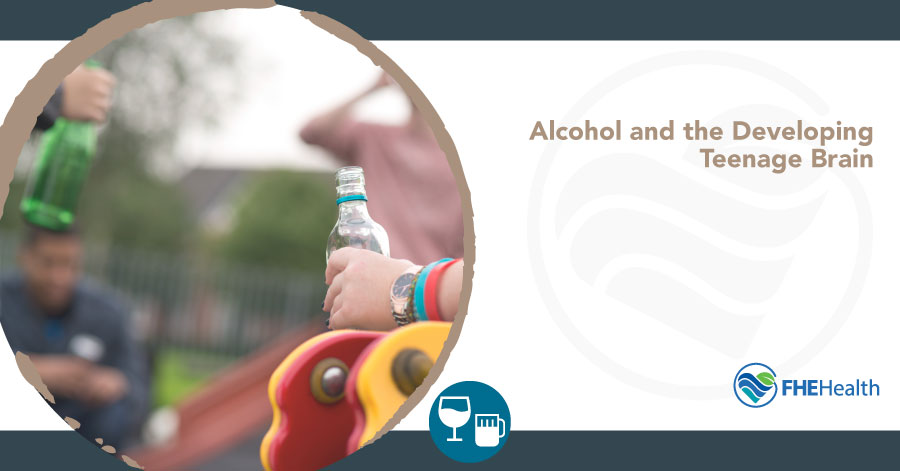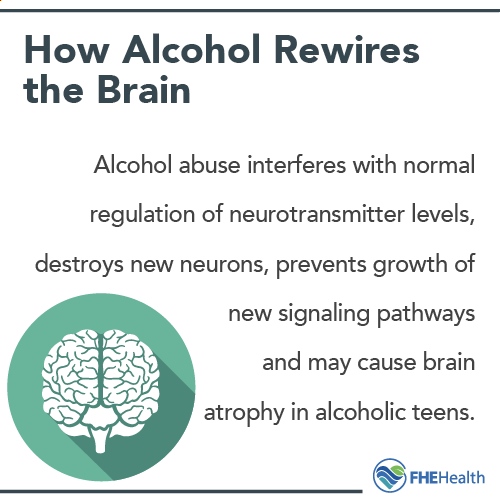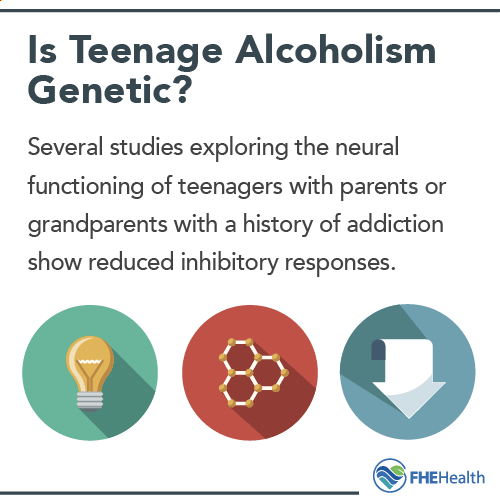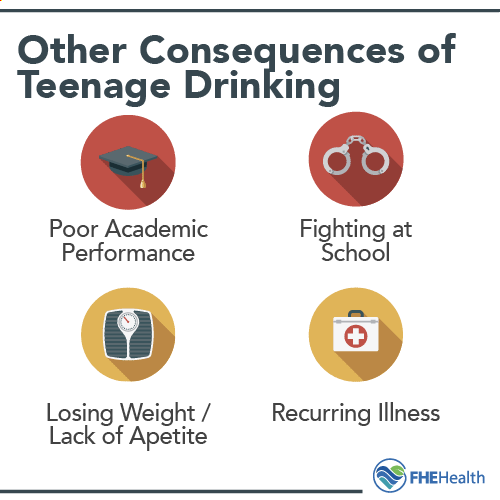
Long-term alcohol abuse is known to cause permanent health problems ranging from cirrhosis of the liver and heart disease to kidney failure and dementia. But what are the effects of alcohol on the brain of adolescents and young adults under 25? Is teenage drinking really more dangerous than adult drinking?
Alcohol Rewires the Brain of Adolescents
 Most teenagers will drink alcohol at some point when hanging out with friends. Parents can lecture their teens endlessly about the dangers of drinking, but it’s inevitable that a teenager has a beer or two at an occasional party. Of course, alcohol won’t damage a teenager’s brain if they drink sporadically. However, when a teen starts drinking every weekend, then graduates to drinking several times a week, they could be rewiring their brain in ways that cause long-term damage.
Most teenagers will drink alcohol at some point when hanging out with friends. Parents can lecture their teens endlessly about the dangers of drinking, but it’s inevitable that a teenager has a beer or two at an occasional party. Of course, alcohol won’t damage a teenager’s brain if they drink sporadically. However, when a teen starts drinking every weekend, then graduates to drinking several times a week, they could be rewiring their brain in ways that cause long-term damage.
Why does this rewiring occur? Humans have millions more neurons at birth than they do as teens and adults. We need these extra neurons as children to learn from our environment and develop valuable cognitive skills. As connections are forged between neurons essential for acquiring and remembering information based on experiences, unused neurons simply die off.
The brain is still winnowing out neurons during adolescence, especially in the prefrontal cortex area of a teen’s brain. The pre-frontal cortex is responsible for impulse control, rational thought, personality, motivation, decision-making, and planning. Just as the whole-brain experiences rapid growth and remodeling in childhood, the prefrontal cortex also continues forming new connections during adolescence.
Developmental changes involving the adolescent prefrontal cortex are controlled by neurotransmitters. Playing a powerfully influential role in shaping teenage behavior following puberty, neurotransmitters also facilitate nerve signaling and communication between neurons.
Alcohol abuse interferes with normal regulation of neurotransmitter levels, destroys new neurons, prevents growth of new signaling pathways and may cause brain atrophy in alcoholic teens. In addition to potentially impairing a teen’s memory and cognition in adulthood, alcohol increases levels of enzymes that cause liver damage.
Why Teenage Alcoholism is More Dangerous Than Adult Alcoholism
Studies have shown the adolescent brain is abnormally susceptible to the harmful effects of alcohol. Teens and young adults show greater impairment (slurring, loss of self-control, lack of inhibition, stumbling) when compared to older adults, after drinking the same amount of alcohol. Doctors think this susceptibility has to do with the immaturity and rapid, ongoing development of the teen brain as well as the surge of puberty hormones.
One of the worst effects of teenage alcoholism is damage to the hippocampus and a teen’s inability to retain new information. Activity of certain hippocampal cells are drastically reduced in teens who drink both occasionally and regularly. Studies also show that high levels of alcohol actually cease activity of memory-forming cells altogether.
Some early research indicates that heavy drinking during adolescence can detrimentally affect normal development of the reproductive system. Female teenagers who drink heavily risk having difficulties getting pregnant later in life, while male teen alcoholics may experience low sperm counts.
Other long-term health problems seen in teens who misuse alcohol include hepatitis, pancreatitis, gout, anemia, hypertension and a variety of nutritional deficiencies. Premature onset of osteoporosis and cholesterolemia is commonly diagnosed in adults who were heavy drinkers as teenagers.
Is Teenage Alcoholism Genetic?

Some studies have discovered differences in the neural functioning and brain structure of teens with an extensive family history of alcoholism and drug abuse. These findings could suggest that susceptibility to substance abuse may have a genetic component. According to one study, teen subjects between 12 and 14 years of age who had alcoholic parents or grandparents had reduced inhibitory responses within the prefrontal cortex and areas involved in addiction.t
Additional research has explored to what degree the effectiveness of medications used to treat alcoholism in teens and adults is dependent on a person’s genetic make-up. The National Institute on Alcohol Abuse and Alcoholism (NIAAA) reports that naltrexone seems to help some people overcome alcohol abuse but not others. Genetic studies comparing genomes of those who respond well to naltrexone and those who don’t have found gene variations between the two groups. Further studies are needed to gain a better understanding of how genes can help doctors develop an effective treatment plan for teens and adults with substance use disorders.
Are the Effects of Teen Alcoholism Permanent?
How much a teen drinks and what kind of alcohol they regularly consume may cause chronic physical or mental problems in the future. Although health issues may not be noticed initially, alcohol abuse during adolescence increases risks of liver damage, hypertension, cardiovascular conditions and pancreatitis as adults. Diseases more commonly diagnosed in adults over 50, such as high cholesterol, high blood pressure, and osteoporosis, may also be diagnosed in teen drinkers before they turn 30.
Consequences of Teenage Drinking–When Parents Should Seek Professional Help
 The CDC lists the following as possible signs of teen drinking:
The CDC lists the following as possible signs of teen drinking:
- An unusual drop in academic performance
- Increased absences at school
- Fighting at school/getting detentions for not following rules
- Complaining of not “feeling good”, especially in the morning (hangovers, nausea, and vomiting)
- Getting arrested for a DUI, public intoxication, disorder conduct, stealing, etc.
- Worsening cognitive problems (inability to remember everyday things, communicating less with family, making irrational or impulsive decisions)
- Losing weight/lack of appetite
- Recurring illnesses, especially upper respiratory illnesses
Teenagers may be able to hide their out-of-control drinking in the beginning but as they drink with more regularity, they won’t be able to conceal their alcoholism from concerned parents.
Do Statistics Show That Adolescent Drinking Indicates a Higher Risk for Adult Substance Abuse?
NIAAA research into risk factors for adult alcoholism found people who started drinking between the ages of 12 and 15 were 50 percent more likely to develop an alcohol abuse problem as adults. For teens who begin drinking after age 15, that risk dipped slightly to around 25 percent. Scientists conducting the large study supported validity of the research by controlling for certain risk factors such as family history of alcoholism and length of time a teen was exposed to drinking (whether from peers or family members)
Authors of the NIAAA study believe that alcohol’s interference with executive cognitive functioning leads older teens and young adults to make poor, sometimes dangerous choices. This co-occurs with diminished decisionmaking abilites, impulse control, and compulsions for immediate gratification.
Call FHE Health Today for Information on Teen Drinking
Treating teenage drinking before alcoholism causes a teen’s life to spiral out of control is critical to their long-term physical and mental health. Early signs of adolescent alcoholism should be addressed quickly by doctors, counselors, and psychologists specializing in teenage drinking. For related information or further guidance regarding next steps in treatment, FHE Health is glad to serve as a resource. Call our trusted counselors today.






